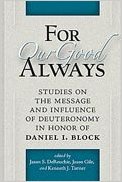With a title adapted from Deuteronomy 6:24, For Our Good Always is a collection of twenty-five new essays from evangelical scholars on the message of Deuteronomy and its influence on Christian Scripture. This collection of studies wrestles with Deuteronomy from historical, literary, theological, and canonical perspectives. In the process, it raises new questions, presents original discoveries, and makes innovative proposals. Part 1 is focused on Deuteronomy’s message and includes ten essays that address the book’s interpretation and specific texts and themes. Part 2 has nine essays that address Deuteronomy’s influence on specific texts or whole books within the Prophets, Writings, and New Testament. Part 3 includes six trajectory-shaping essays that consider the lasting significance of Deuteronomy for Christian preaching and ethics.
We are pleased today to speak with Jason DeRouchie, one of the editors of the book. To our delight, Dr. DeRouchie tells us not only about his book – he takes the time to teach us much about the message of Deuteronomy and its significance for Christians.
Books At a Glance (Fred Zaspel):
First, especially for our readers who may not be acquainted with him, please tell us something about Daniel Block — his career, his leading contributions, your relationship with him, etc. — and what considerations gave rise to this new Festschrift in his honor.
Jason DeRouchie:
The volume is offered in honor of my doctoral father, Daniel I. Block, on the occasion of his 70th birthday. He is presently the Gunther H. Knoedler Professor of Old Testament at Wheaton College, but in the past he has served at Providence College, Bethel Seminary, and Southern Seminary. I was first attracted to Block because of his rigorous scholarship matched by his heart for the Lord and his church.
In this generation, few Old Testament scholars have worked so ably, carefully, and intentionally to help the church and the academy grasp the message of the Old Testament in general and Deuteronomy in particular. Block’s studies always exhibit an admirable balance of exegetical rigor, literary and theological awareness, and pastoral care. He is perhaps most well-known for his two volume commentary on The Book of Ezekiel in Eerdman’s NICOT series (1997, 1998), but he has also written major works on Judges and Ruth (B&H, 1999), ancient Near Eastern national theology (Wipf&Stock, 2013), Obadiah (Zondervan, 2014), and, most recently, a biblical theology of worship (Baker, 2014). Pride of place in recent days, however, must go to his work on Deuteronomy.
For well over a decade Block has, like the priest-scribe Ezra, devoted himself to the study, practice, and teaching of the deuteronomic torah (Ezra 7:10) in order to help and urge others to hear the life-giving gospel of Moses in Deuteronomy. Block has recently completed an 800-page pastoral commentary on Deuteronomy in Zondervan’s NIVAC series (2012), which I believe is the best overall Deuteronomy commentary on the market. I say this even though I differ at some key points with Block’s interpretation. Many of his essays on Deuteronomy have now been collected in two accessible volumes: How I Love Your Torah, O LORD! Studies in the Book of Deuteronomy (Cascade, 2011) and The Gospel according to Moses: Theological and Ethical Reflections on the Book of Deuteronomy (Cascade, 2012).
 Books At a Glance:
Books At a Glance:
What is the significance of your chosen title, For Our Good Always?
Jason DeRouchie:
The title For Our Good Always derives from Deuteronomy 6:24, which occurs in one of Deuteronomy’s family discipleship passages and helps clarify the revealed purpose of Yahweh’s commands: “And the LORD commanded us to do all these statutes, to fear the LORD our God, for our good always, that he might preserve us alive, as we are this day” (ESV). Here Yahweh highlights that following his lead would result in life and blessing, good and not harm. Therefore, the people needed to “choose life, that you and your offspring may live” (Deuteronomy 30:19).
Sadly, Israel was “stubborn” (Deuteronomy 9:6, 13; 10:16; 31:27), “unbelieving” (Deuteronomy 1:32; 9:23; 28:66), and “rebellious” (Deuteronomy 1:26, 43; 9:7, 23–24; 21:18, 20; 31:27), and in God’s eternal purposes climaxing in Jesus, he chose not to change their hard hearts, at least not yet: “To this day Yahweh has not given you a heart to understand or eyes to see or ears to hear” (Deuteronomy 29:4; cf. Romans 11:8, 10; 2 Corinthians 3:14)! Israel’s sin would only increase in the land, ultimately resulting in their exile and death in the latter days (Deuteronomy 4:25–28; 31:27–29). Moses would have affirmed Paul’s assertion that the old covenant bore a “ministry of condemnation”; this was so that the glory of Christ might be all the more magnified in the new covenant’s “ministry of righteousness” (2 Corinthians 3:9).
On the basis of Jesus’ perfect statute keeping (Romans 5:18; cf. Philippians 2:8; Hebrews 4:15; 1 Peter 2:22; 1 John 3:5), Christians have been freed from the law’s condemning power (Romans 8:1–3; cf. Colossians 2:14) and empowered by the Spirit of the resurrected Christ to fulfill the righteous requirement of the law by living the life of love (Romans 8:4; 13:8–10; cf. Deuteronomy 30:6, 8; Ezekiel 36:27; Romans 2:26–29). And “if by the Spirit you put to death the deeds of the body, you will live” (Romans 8:13). Similarly, “Now that you have been set free from sin and have become slaves of God, the fruit you get leads to sanctification and its end, eternal life” (Romans 6:22).
God’s “law is holy, and the commandment is holy and righteous and good” (Romans 7:12). But apart from Christ, the law only discloses and multiplies sin (Romans 3:20; 5:20; 7:7; Galatians 3:19). In Christ, the law’s demands are met, and all God’s goodness is secured on behalf of those who believe. Then the Spirit empowers us to follow in ever-increasing ways for our good always. So we say with Paul, “Thanks be to God, that [we] who were once slaves of sin have become obedient from the heart to the standard of teaching to which [we] were committed” (Romans 6:17)––the law of Christ embodied in human lives (2 Corinthians 3:3; cf. Jeremiah 31:33).
Books At a Glance:
You have assembled an impressive list of contributors to this book. What considerations led to their selection? At least some are former students of Block, such as you, but were there any other “common” factors?
Jason DeRouchie:
The international group of specialists that contributed to this volume consists of Daniel Block’s colleagues, friends, and former students. All participants have a personal relationship with Dan, and the editors strongly encouraged them to write with the same type of balance between scholarly aptitude and pastoral care exemplified in Dan’s own writings. Most of the scholars identify themselves within conservative evangelicalism, affirming the doctrine of inerrancy. Still others readily accept the presuppositions of historical criticism, and their essays reflect such views. Contributors include Danny Akin, Christopher Ansberry, Jason DeRouchie, Peter Gentry, Jason Gile, Michael Graves, Michael Grisanti, Richard Hess, Harry Hoffner Jr., Jerry Hwang, Rebekah Josberger, Elmer Martens, Thomas McClendon Jr., J. Gordon McConville, Alan Millard, Douglas Moo, Grant Osborne, Richard Schultz, Gary Smith, Myrto Theocharous, Charlie Trimm, Kenneth Turner, Peter Vogt, Gordon Wenham, and Hugh Williamson.
Books At a Glance:
Can you describe for us briefly the significance of Deuteronomy in the Canon? What primary contributions does it make?
Jason DeRouchie:
No other book colors the tapestry of biblical thought quite like Deuteronomy. It synthesized the theology of the Pentateuch, provided Israel with a constitution for guiding their covenant relationship with Yahweh in the promised land, and served as a primary lens through which later biblical authors interpreted redemptive history. From it Jesus battled the devil in the wilderness, and from it Paul built his understanding of the relationship of the old and new covenants. I am convinced that it is because of Moses’ teaching in Deuteronomy that Paul rightly understood the old covenant to have “a ministry of condemnation” (2 Corinthians 3:9; cf. Deuteronomy 29:4[3]; 31:27–29).
With this, the so-called “Deuteronomistic History” (Joshua–Kings) gets its name from Deuteronomy’s apparent influence on these books. Similarly, the prophets grounded their teaching in Moses’ law (2 Kings 17:13; Malachi 4:4), and their warnings of judgment and their hopes of restoration were all controlled by the covenant curses and restoration blessings found Moses’ words. The psalmists and sages too called for lives shaped around God’s law (Psalm 19:7–11; Proverbs 1:8; Ecclesiastes 12:13). Whether priest, prophet, prince, poet, parent, or the like, they were called to meditate on the Deuteronomic law (Joshua 1:8; Psalm 1:3; Nehemiah 8:13) and to teach it faithfully from generation to generation (Deuteronomy 6:7; 17:18–20; 18:18; 31:11; 33:10; Psalm 78:5), until the day when the “prophet like Moses” would rise (Deuteronomy 18:15, 18; 34:10; cf. Luke 7:16 with 9:35; Acts 3:22–26), providing new covenant teaching that would both fulfill and supersede Moses’ voice (Matt 7:24–27; 17:5; 28:20; John 16:12–14;17:8, 18, 20; 2 Thess 2:15; Heb 1:1–2).
Books At a Glance:
Click here to see Part 2 of our interview with Dr. DeRouchie, where he talks to us at length about his work on the ten commandments.
Buy the books

FOR OUR GOOD ALWAYS
